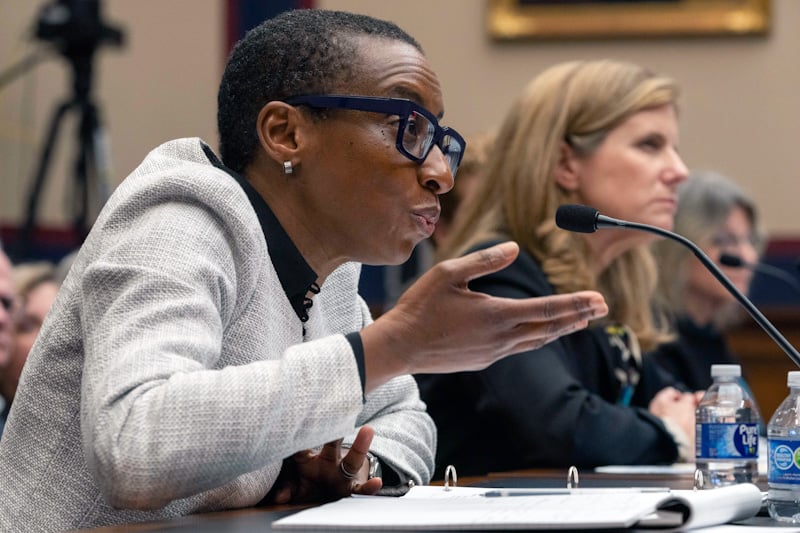Law firm boycotts on-campus interviews at Harvard Law because of congressional testimony by its president

Claudine Gay, president of Harvard University, left, speaks as Liz Magill, then-president of the University of Pennsylvania, listens, during a hearing of the House Committee on Education and the Workforce on Dec. 5. Photo by Mark Schiefelbein/The Associated Press.
The plaintiffs law firm Edelson has said it won’t be participating in on-campus interviews at Harvard Law School because of statements about genocide by the university’s president, Claudine Gay, during congressional testimony earlier this month.
Edelson informed Harvard Law its decision in a Dec. 14 letter, Reuters reports.
The letter faulted Gay for refusing “to unequivocally state that advocating for genocide would breach the school’s code of conduct.”
“Despite her belated apology, the gravity of her initial response cannot be overlooked,” the letter said.
The firm will boycott the spring interview program that begins in late January and on-campus interviews in August, firm founder Jay Edelson told Reuters.
The Edelson letter said the firm is “currently exploring alternative channels to connect” with Harvard Law students who are interested in opportunities at Edelson so as not to penalize students for matters beyond their control.
Gay and two other university presidents were “relentlessly interrogated” during their Dec. 5 testimony about their campus policies on campus antisemitism, wrote Above the Law founder David Lat at Original Jurisdiction.
Liz Magill, the president of the University of Pennsylvania, who also refused to say calls for genocide violated campus policy, later resigned, as reported by the Associated Press.
Gay had testified that Harvard University embraces “a commitment to free expression, even of views that are objectionable, offensive [or] hateful,” Lat reported in a prior article for Original Jurisdiction. But “when that speech crosses into conduct that violates our policies against bullying, harassment [or] intimidation,” then the university must act, she said.
According to Lat, Harvard University’s code of conduct appears to make a distinction between speech specifically directed at people and speech that merely expresses offensive viewpoints.
“If I repeatedly send antisemitic emails and texts to a single Jewish student, that is far more likely to constitute harassment than if I set up an antisemitic website available to the entire world,” Lat explains.
Lat spoke with experts on crisis management for their take on the testimony.
“I would have told them that, first and foremost, this is theater and not a legal proceeding,” said Joshua Galper, co-founder of the strategic communications company Trident DMG and the firm Galper & Goldberg. “A hearing isn’t the time to lecture Congress on the nuances of the First Amendment and campus conduct codes.”
Galper said it would have helped for the university presidents to show greater humility.
“That will beat a legalistic response every time,” Galper said.



